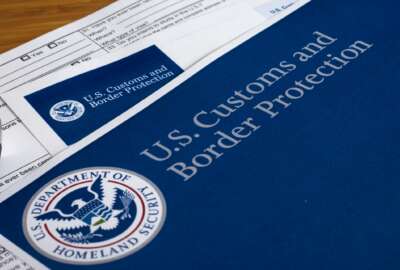
CBP issues partial stop work order on Accenture hiring contract
Customs and Border Protection has told Accenture Federal Services to stop some work on the $297 million contract it signed late last year to help the agency more...
Customs and Border Protection has issued Accenture Federal Services, the vendor the agency hired to help CBP recruit border patrol agents and officers more quickly, a partial stop work order.
The agency coordinated with Accenture and has asked the vendor to “reduce emphasis on some elements of the contract to allow more emphasis on others,” a CBP spokeswoman wrote in an email to Federal News Network.
Specifically, the agency asked Accenture to stop work on applicant processing, because the agency has more than enough capacity available to handle those activities on its own, the spokeswoman said. In addition, CBP will resume responsibility for performing polygraphs on its applicants. And because there are a limited number of polygraphists in the market, it makes more sense for CBP to perform that work rather than having Accenture compete with the agency for polygraph personnel and resources, the agency said.
“We do continue to need and see positive results from activities related to marketing, advertising, applicant care and data analytics,” the CBP spokeswoman said. “Therefore, we are asking Accenture to continue effort in those areas while we continue to assess what, if any, more permanent changes to the contract might be appropriate.”
The partial stop work order notice came before a damning report from the Department of Homeland Security’s inspector general, which questioned whether Accenture had truly lived up to the promises described in the $297 million contract that CBP signed with the company last November.
“We remain focused on fulfilling our client’s expectations under our contract,” a spokeswoman for Accenture Federal Services said in an email to Federal News Network.
Accenture had agreed to help the agency move qualified applicants through CBP’s 12-step hiring process, test and vet candidates and improve the process for the better.
Mission shortfalls
Under the contract, which includes one base year and four additional option years, CBP asked Accenture to help the agency hire 7,500 qualified applicants to positions as border patrol agents, CBP officers and air and marine interdiction agents.
“Accenture is nowhere near satisfying its 7,500-person hiring goal over the next 5 years,” the IG wrote in a Dec. 6 management alert. “Further, CBP has used significant staffing and resources to help Accenture do the job for which it was contracted. As such, we are concerned that CBP may have paid Accenture for services and tools not provided.”
Accenture planned to execute its own hiring process in tandem with CBP’s and collaborate with the agency along the way. CBP designed the contract so that the agency would pay Accenture — up to $40,000 per hire — once a new applicant accepted the agency’s job offer and began duty.
But as of Oct. 1, CBP had paid Accenture $13.6 million for startup costs, security requirements, recruiting and applicant support, the IG said. Accenture had processed two accepted job offers.
CBP, however, said Accenture had contributed more than the two accepted job offers.
“In return for $13.6 million, Accenture has created a hiring structure, tailored technology solutions to support and manage the hiring process, stood up an applicant care center, marketed and recruited thousands of new applicants and conducted many of the hiring steps for several thousand applicants,” CBP wrote in response to the IG’s alert.
In addition, the IG said CBP handled much of the work that Accenture was originally supposed to do. While CBP gave Accenture a three-month interim period to ramp up more operations to fulfill the contract’s terms, the agency processed and hired 14 applicants on behalf of its contractor.
“During this period, since Accenture could not determine which applicants it recruited, CBP agreed to give credit and temporarily pay Accenture for a percentage of all applicants regardless of whether CBP or Accenture processed the applicants,” the IG said.
All 14 applicants accepted job offers, and seven started duty by Oct. 1. As such, CBP paid $500,000 to Accenture for the work it had completed.
Struggle to attract, hire border agents
CBP awarded the contract, in part, to help the agency meet the demands of the president’s 2017 executive orders on border security, which ordered the Homeland Security Department and CBP to hire as many as 15,000 new border patrol agents and immigration officers. To get started, the Trump administration charged DHS human capital leadership to hire 5,000 new employees.
But CBP has long struggled to attract and hire qualified border patrol agents and officers. The agency has condensed its 12-step hiring process into more measurable segments and had cut its time-to-hire from 400 to 170 days, Kevin McAleenan, CBP’s commissioner, said in 2017.
The National Border Patrol Council estimated the Border Patrol had to recruit and train 2,729 new agents a year for the next five years to meet the president’s hiring demands. The Border Patrol hasn’t met hiring and staffing targets since fiscal 2014, the House Homeland Security Committee said earlier this year.
Several members of Congress had criticized the Accenture contract when CBP first announced it, and many more lawmakers said the IG’s recent report reaffirmed their concerns.
Rep. Gerry Connolly (D-Va.), the likely chairman of the Oversight and Government Reform subcommittee on government operations, called for a hearing on the IG’s recent report.
House Homeland Security Committee Ranking Member Bennie Thompson (D-Miss.), the likely chairman of the committee in the next Congress, said he continues to doubt CBP’s rationale on the Accenture contract.
“Going forward, it is critical CBP complete a thorough assessment of which aspects of this contract are and are not effective,” Thompson said Monday afternoon in a statement. “I also suggest that CBP consider whether some of the contract money not yet obligated could be used to go toward workforce incentives to promote retention of its current personnel.”
The National Treasury Employees Union, which represents some CBP officers and agriculture specialists, called the contract a “waste.” CBP still needs to hire 2,500 additional CBP officers and more than 700 agriculture specialists to meet the agency’s current staffing models, according to NTEU.
“The $297 million would have been better spent to pay the salaries of as many new Office of Field Operations employees — recruited and processed by DHS’s and CBP’s existing personnel — as possible, as well as for recruitment, relocation and retention and other incentives,” NTEU National President Tony Reardon said in a statement.
Copyright © 2025 Federal News Network. All rights reserved. This website is not intended for users located within the European Economic Area.
Nicole Ogrysko is a reporter for Federal News Network focusing on the federal workforce and federal pay and benefits.
Follow @nogryskoWFED
Related Stories

As Trump debates border security, field agents decry existing, dire staffing shortages




